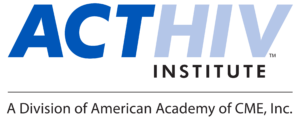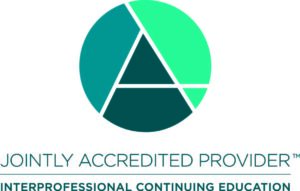Case Studies in HIV Prevention and Treatment of Persons Who Use Drugs
|
Release Date: October 11, 2023 |
 |
Support for this activity has been made possible through an |
Educational Need:
Prevention of HIV in individuals with substance use disorder (SUD) is vitally important from a public health perspective. People with SUD are significantly more vulnerable to contracting HIV, attributable to behaviors such as sharing needles and injection equipment, engaging in condomless sex, and impaired judgement. Furthermore, substance use can negatively affect medication adherence and engagement in healthcare, making it more challenging to treat and manage HIV in this population. This can lead to rapid disease progression, development of multi-drug resistance and increased morbidity and mortality. Effective prevention strategies such as harm reduction programs, substance use treatment, access to mental health services and access to pre-exposure prophylaxis (PrEP) are crucial in reducing HIV transmission rates among individuals with SUD. Addressing both SUD and HIV prevention simultaneously, through a team-based integrated model of care, can both improve health outcomes of infected individuals and contribute to broader efforts to curb the HIV epidemic. .
Learning Objectives
- Identify the specific behaviors and risk factors associated with substance use disorder (SUD) that contribute to an increased risk of HIV transmission.
- Explain the significance of addressing HIV prevention and SUD concurrently through an integrated care model to improve uptake of HIV prevention tools in this population.
- Identify barriers and facilitators for HIV prevention in individuals with SUD.
Activity Faculty
|
|
Faculty Bios:
Alexandra Canetti, MD, is a board-certified child and adolescent and adult psychiatrist with an interest in community psychiatry and family issues. She was born and raised in Puerto Rico. Dr. Canetti graduated with honors with a Bachelor of Science in pre-medicine from the University of Puerto Rico. She completed her medical degree at Universidad Central del Caribe in Puerto Rico, and her residency in adult psychiatry at Cabrini Medical Center. She graduated from her Child and Adolescent Psychiatry Fellowship at St. Vincents Medical Center, where she was the chief fellow. She joined the training faculty at the Columbia HIV Training Project and AIDS Education Training Center of NY/NJ and has interest in culturally competent family-based care to children and youth with medical illnesses. She currently serves as the Program Medical Director of the Special Needs Clinic, where she treats the mental health needs of individuals and families affected by medical illness, and of the School-Based Mental Health Program.
Dana Serafin, MSN, CRNP earned her Master of Science degree in Nursing (MSN) from Thomas Jefferson University. Her career has been shaped by providing comprehensive and inclusive healthcare to historically marginalized communities. She spent the early part of her career helping to establish and expand an adolescent and young adult practice at a community health center in the Bronx, NY. Over the past 2 years she has served as the Associate Medical Director of PrEP services at Philadelphia FIGHT, an FQHC in Philadelphia, PA. Her current practice focuses on HIV prevention and PrEP as well as holistic primary care for adults and adolescents. Her expertise extends to caring for people with HIV, reproductive healthcare and gynecological services, and gender affirming care for a diverse LGBTQI+ community.
Accreditation and Credit Designation

In support of improving patient care, American Academy of CME, Inc. is Jointly accredited by the Accreditation Council for Continuing Medical Education (ACCME), the Accreditation Council for Pharmacy Education (ACPE), and the American Nurses Credentialing Center (ANCC), to provide continuing education for the healthcare team.
Physicians
American Academy of CME, Inc., designates this enduring material for a maximum of 1.00 AMA PRA Category 1 CreditsTM. Physicians should claim only the credit commensurate with the extent of their participation in the activity.
Nurse Practitioners and Nurses
American Academy of CME, Inc., designates this educational activity for 1.00 ANCC contact hours.
California
Provider approved by the California Board of Registered Nursing, Provider Number CEP16993 for 1.00 contact hours.
Physician Assistants
American Academy of CME, Inc. has been authorized by the American Academy of PAs (AAPA) to award AAPA Category 1 CME credit for activities planned in accordance with AAPA CME Criteria. This activity is designated for 1.00 AAPA Category 1 CME credits. Approval is valid until October 11, 2024. PAs should only claim credit commensurate with the extent of their participation.
All other members of the care team will receive a certificate of participation.
Target Audience
This activity has been designed to meet the educational needs of the HIV care team, including physicians (both specialists and primary care/family medicine), nurses, nurse practitioners, physician assistants, and pharmacists who are in practice but are newer to HIV medicine or who are in training. Other healthcare providers may also participate.
Disclosure Statement
According to the disclosure policy of the Academy, all faculty, planning committee members, editors, managers and other individuals who are in a position to control content are required to disclose any relationships with any ineligible company(ies). The existence of these relationships is not viewed as implying bias or decreasing the value of the activity. Clinical content has been reviewed for fair balance and scientific objectivity, and all of the relevant financial relationships listed for these individuals have been mitigated.
Disclosure of relevant financial relationships are as follows:
Faculty Educator/Planners
Alexandra Canetti, MD: No relevant financial relationships to disclose.
Dana Serafin, MSN, CRNP: No relevant financial relationships to disclose.
Planners
John JD Juchniewicz, MCIS, CHCP, FACEHP; Sondra Moylan, MS, RN; Edward Moylan RP: No relevant financial relationships to disclose.
ACTHIV® Institute Advisory Board Disclosures:
Roger Bedimo, MD, MS, discloses the following: Advisory Board— ViiV Healthcare, Gilead Sciences, Merck, Theratechnologies, Janssen, Shionogi; Grant/Research Support: Merck, Merck*
Carlos del Rio, MD: No relevant financial relationships to disclose.
Jose Gutierrez, PhD, FNP-BC: No relevant financial relationships to disclose.
H. Nina Kim, MD, MSc, discloses the following: Grant/Research Support—Gilead Sciences
Asa E. Radix, MD, PhD, MPH: No relevant financial relationships to disclose.
William R. Short, MD, MPH, discloses the following: Advisory Board—ViiV, Gilead Sciences; Grant/Research Support—Gilead Sciences; Janssen*
Sarah Smith, MHS, PA-C, AAHIVS, discloses the following: Advisory Board—ViiV, Gilead Sciences, Janssen, Merck; Speaker’s Bureau— ViiV, Gilead Sciences, Janssen, Merck
Susan Weiss, FNP-BC, MSN, discloses the following: Advisory Board—ViiV, ViiV*
*Relationship has ended
This activity reviews off-label or investigational information.
The opinions expressed in this accredited continuing education activity are those of the faculty, and do not represent those of the Academy or its ACTHIV® Institute. This educational activity is intended as a supplement to existing knowledge, published information, and practice guidelines. Learners should appraise the information presented critically, and draw conclusions only after careful consideration of all available scientific information.
Implicit Bias
Implicit bias refers to unconscious attitudes and stereotypes that influence our thoughts, judgements, decisions, and actions without our awareness. Everyone is susceptible to implicit bias, even clinicians. In healthcare, implicit biases can have a significant impact on the quality of care an individual receives. These biases can be both favorable and unfavorable, and are activated involuntarily without an individual’s awareness or intentional control. Studies have indicated that healthcare providers’ incorrect perceptions can impact providers’ communications and clinical decision-making contributing to disparities in clinical outcomes. Addressing implicit biases in healthcare is critical to improving health outcomes and promoting health equity for all patients. Patient-centered care can reduce the impact of implicit bias, by treating each patient as a unique individual who may or may not hold beliefs associated with their backgrounds and circumstances. In addition, recognizing implicit bias in one’s own practice using techniques such as self-reflection and mindful clinical decision-making can ensure more equitable and effective care to all patients.
Over the past several decades, cognitive science research has demonstrated human behavior, beliefs and attitudes are shaped by automatic and unconscious cognitive processes. The healthcare profession is devoting greater attention to how these automatic and unconscious processes impact care including: (1) preferential treatment toward or against specific patient populations causing healthcare inequities, (2) influence patient-provider communications leading to misunderstandings and mistrust, and (3) impact access to healthcare and affect treatment decisions resulting in misdiagnosis, delays in treatment and specialty referrals and poor pain management. Considering one might have unconscious biases and exploring them may be uncomfortable because the very idea that they exist may conflict with how clinicians perceive themselves. It is only by becoming aware of one’s unconscious biases that members of the healthcare team can take steps to mitigate them to ensure all their patients are treated receive quality healthcare.
Instructions on How to Receive Credit
There are no fees to participate in the activity. Participants must review the activity information including the learning objectives and disclosure statements, as well as the content of the activity. To receive CME/CE credit for your participation, please complete the post-assessment and program evaluation. Your certificate will be available for printing immediately.
Privacy and Contact
For more information about the American Academy of CME privacy policy, please access http://www.academycme.org/privacy.htm For any questions, please contact: [email protected].
Hardware/Software Requirements
This program should be viewed at a resolution of 1024 x 768 or higher using current versions of Microsoft Internet Explorer, Firefox, Chrome or Safari. A high-speed Internet connection is recommended.
Copyright
© 2023. This accredited continuing education activity is held as copyrighted © by American Academy of CME. Through this notice, the Academy grants permission of its use for educational purposes only. These materials may not be used, in whole or in part, for any commercial purposes without prior permission in writing from the copyright owner(s).


